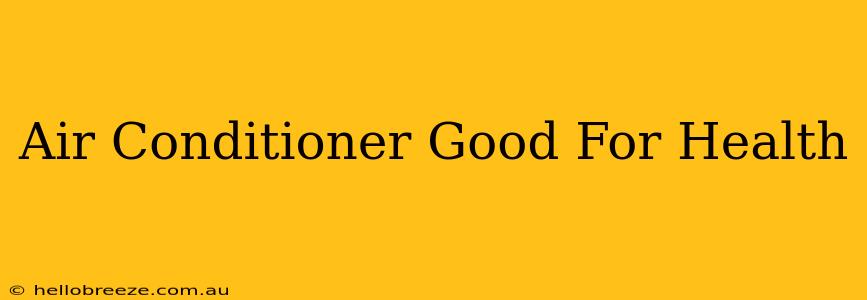Air conditioning. For many, it's the sweet relief from scorching summer heat. But beyond comfort, is air conditioning actually good for your health? The answer, like most things, is nuanced. This article delves into the potential health benefits and drawbacks of using air conditioning, helping you make informed decisions about its use in your home.
The Health Benefits of Air Conditioning
While excessive use can have downsides, strategically using air conditioning can significantly improve your health and well-being, especially for vulnerable populations.
1. Protecting Against Heat-Related Illnesses:
This is arguably the most significant benefit. Heatstroke, heat exhaustion, and other heat-related illnesses are serious health risks, potentially leading to hospitalization or even death. Air conditioning provides a safe haven, significantly reducing the risk of these dangerous conditions, particularly for:
- Infants and young children: Their bodies regulate temperature less efficiently.
- Older adults: They are more susceptible to heat-related illnesses.
- People with chronic illnesses: Conditions like heart disease and respiratory problems can be exacerbated by heat.
2. Improved Respiratory Health:
For those with respiratory conditions like asthma or allergies, air conditioning can offer some relief. By filtering out pollen, dust mites, and other airborne allergens, air conditioners can help reduce allergy symptoms and asthma attacks. However, it's crucial to regularly clean and maintain your AC unit to prevent the growth of mold and mildew, which can worsen respiratory problems.
3. Better Sleep Quality:
A comfortably cool room significantly improves sleep quality. Overheating at night disrupts sleep cycles, leading to fatigue and reduced cognitive function. Air conditioning helps maintain a consistent, cool sleep environment, promoting restful sleep and better overall health.
4. Increased Productivity and Focus:
When you're not constantly battling the heat, you are more likely to be focused and productive. Discomfort from extreme heat reduces concentration and mental performance. A cool environment allows for better cognitive function and enhanced productivity.
Potential Downsides of Air Conditioning
While air conditioning offers many health advantages, it’s essential to acknowledge potential drawbacks:
1. Dehydration:
Air conditioning can dry out the air, leading to dehydration. Drink plenty of water to counteract this effect.
2. Dry Skin and Eyes:
The dry air can irritate skin and eyes, causing dryness and discomfort. Consider using a humidifier to add moisture to the air.
3. Sick Building Syndrome:
Poorly maintained air conditioning systems can contribute to Sick Building Syndrome. This involves symptoms like headaches, fatigue, and respiratory problems, often linked to poor air quality within the building. Regular maintenance and cleaning of your AC unit are crucial to prevent this.
4. Increased Energy Consumption and Environmental Impact:
Air conditioning is energy-intensive. Excessive use contributes to higher energy bills and a larger carbon footprint. Consider energy-efficient models and use air conditioning judiciously to minimize its environmental impact.
Conclusion: Striking a Balance
Air conditioning, when used responsibly and with consideration for its potential drawbacks, can be a valuable asset to your health and well-being. By understanding its benefits and drawbacks, you can make informed decisions about its use and enjoy a healthier, more comfortable life. Remember, regular maintenance, mindful usage, and addressing potential dry air issues are key to maximizing the positive effects of air conditioning and minimizing any negative consequences.

